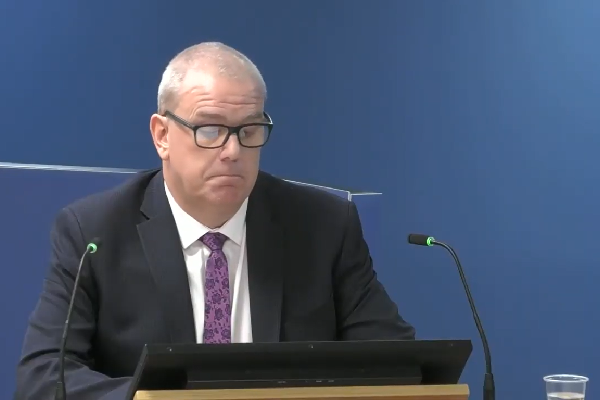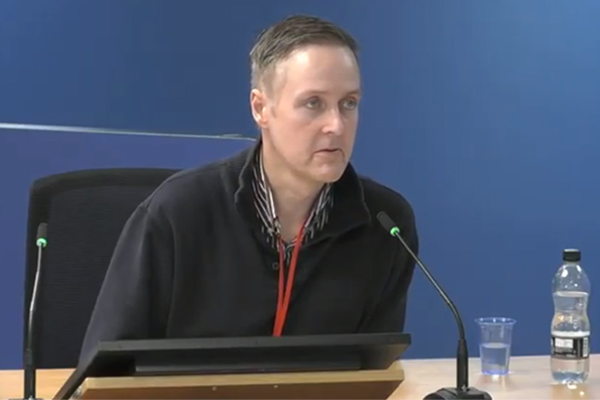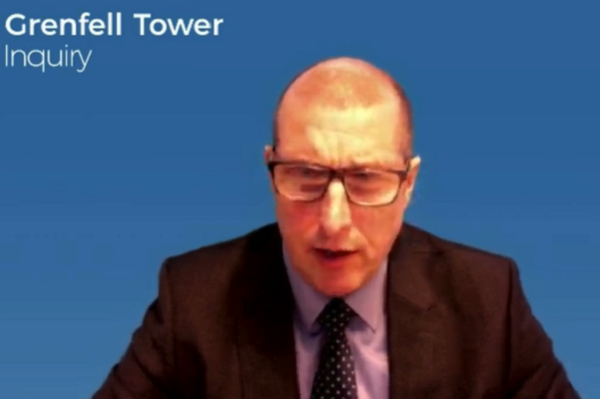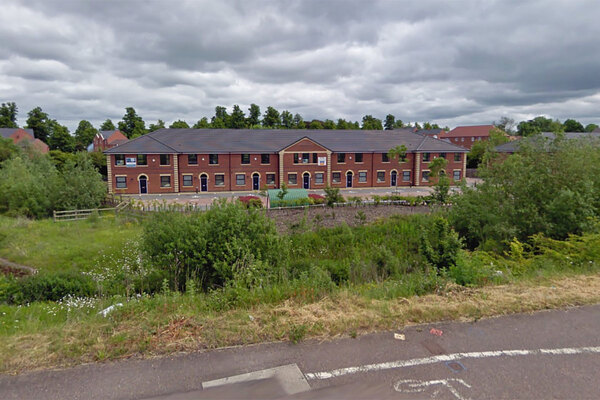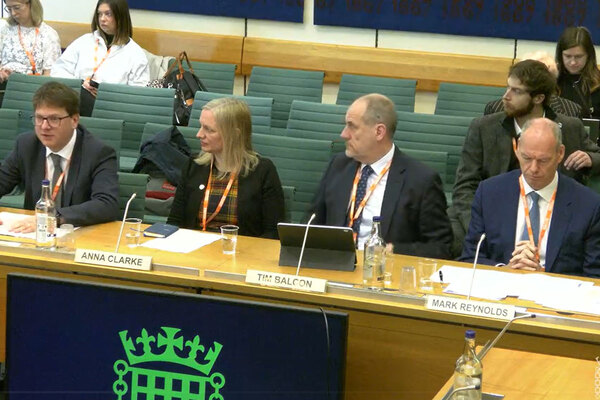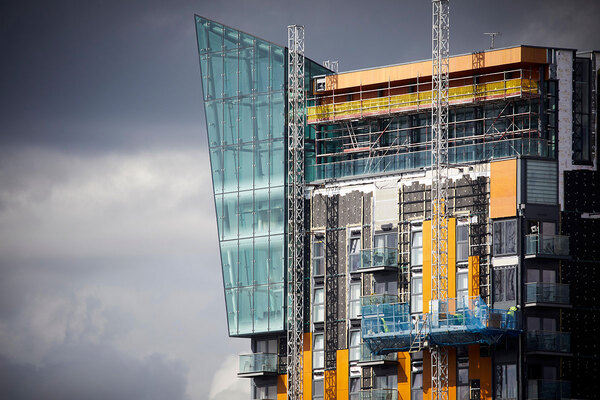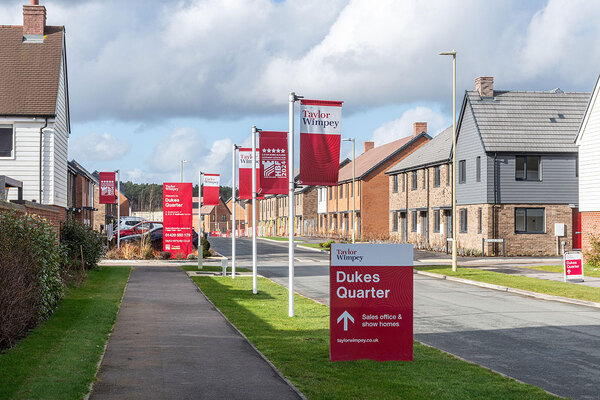NHBC denies being ‘poodle’ for Kingspan in accepting combustible insulation on high rises
A senior staff member at the National House Building Council (NHBC) has denied the organisation was “captured by Kingspan” and “used by them as their poodles” in continuing to sign off the use of its combustible insulation on high rises after learning it was not supported by testing.
Steve Evans, head of technical operations at the NHBC, was grilled today about the company’s failure to reject the use of Kingspan’s market-leading K15 insulation after it was alerted to its limited fire testing in 2013.
The NHBC is the country’s largest private building control inspector, as well as being the major warranty provider for new build homes, making its views on the insulation hugely significant for its acceptability.
The inquiry has previously heard that Kingspan was able to market its K15 insulation as suitable for use on high rises for more than a decade, despite only having testing which permitted its use in a single cladding system, unrepresentative of those in real world use.
The inquiry saw today that NHBC was alerted by a consultancy in autumn 2013 that the material should not be used on high rises outside of one specific system tested in 2006.
However, the NHBC had been accepting its use in a much wider range of buildings on the basis of a British Board of Agrément (BBA) certificate issued in 2008 which implied it was acceptable, providing an assurance was received from Kingspan.
BBA witnesses accepted when they gave evidence to the inquiry that the certificate was “misleading” and a result of a “very basic failure of due diligence”.
Mr Evans told the inquiry today that the use of K15 on high rises was accepted by NHBC “only on the basis of the BBA certificate” and that it carried out “no separate independent investigation” of its suitability.
Emails showed that in November 2013 one of its building control officers sent an email to colleagues saying the firm “have doubts with respect to the combustibility aspect of the product” and “won’t be accepting it on new projects until we’ve carried out further investigation”.
Another officer replied a few days later chasing for an update and noting “all high rise will be forced to use Rockwool [a non-combustible alternative to Kingspan]” if K15 was not accepted.
“As you can imagine, this will cause a major issue with our customers, as they all use board insulation to gain their u-values [measurement of insulation performance],” he wrote.
“Do you agree that for NHBC to say that they would no longer accept those forms of combustible insulation on buildings above 18 metres was going to have a massive effect on its own business?” asked Richard Millett QC, lead counsel to the inquiry.
“It would have a massive effect on our builder customers in terms of then asking them to change their specification, yes,” replied Mr Evans.
Despite the claim in the email, the NHBC did continue to accept the product on new projects on the basis only of the assurance from Kingspan.
“Did anyone at the NHBC recognise at the time that it was underwriting… the use of a combustible product in an external wall over 18 metres on the untested and unexamined say so the manufacturer of that very product?” asked Mr Millett.
“Not that I’m aware of, until we started to look at it in 2013,” replied Mr Evans.
“And was that not a glaringly obviously dangerous approach, not only for the NHBC reputation and financially, but for the health and safety of the occupants of these buildings?” asked Mr Millett.
“I can see how you can… arrive at that conclusion. But at that point there was still nothing to say those buildings were dangerous,” he replied.
The BBA certificate was later amended in December 2013, removing the instruction to contact Kingspan to check compliance and implying the material could actually only be used in a narrower set of circumstances justified by testing.
NHBC went on to meet with Kingspan in January 2014, with the manufacturer promising to carry out additional tests to prove the suitability of its insulation in a wider range of systems.
Mr Evans said this was enough assurance for NHBC to continue accepting the use of the product while it awaited the outcome of these tests.
“If we’d taken a knee-jerk reaction to say we’re not accepting it on any building… that would have meant, at that point, a great deal of upheaval for those designers, builders for the industry as a whole, which could in three months time have actually been demonstrated was the wrong action,” he said.
“Did it not occur to you at the time that really this is this was a very soft and lax approach to fire safety and that really in effect you had been captured by Kingspan were being used by them as their poodles?” said Mr Millett.
“No, I don’t believe that’s the case at all,” replied Mr Evans. “We had one test which had demonstrated the material could be used [on buildings] over 18 metres. There was no evidence at this point that Kingspan would not be able to provide further testing to demonstrate that.
“So it was a case of working with industry as a whole to allow industry to provide that information.”
Mr Evans continued to justify NHBC’s ongoing acceptance of K15 on the basis that “we didn’t have information at the time that it was unsafe”.
“With great respect there’s nothing in [the official guidance] is there that says that you can put K15 [on buildings] above 18 metres unless you know it’s not safe. That’s not how the regulation works is it?” said Mr Millett.
Mr Evans again said he was willing to “allow industry to furnish us with further information to demonstrate that it could be safe”.
Mr Millett asked if the NHBC had ever considered what it should do about the previous buildings it had signed off and whether it had “potentially enormous exposure as a result”.
“Can I suggest a reason why you weren’t tougher with them [Kingspan] and that is because had you been tougher with them, you would have had… a barrage of claims from myriad building owners?” asked Mr Millett.
“My concern and my focus at the time was not on the historic projects, my concern was with the buildings which were presently going through the design,” said Mr Evans.
The inquiry has previously heard that Kingspan used its lawyers to threaten the NHBC in January 2015 when it suggested it would stop accepting the use of K15 on high-rise buildings.
The inquiry continues with further evidence from Mr Evans tomorrow.
Sign up for our weekly Grenfell Inquiry newsletter
Each week we send out a newsletter rounding up the key news from the Grenfell Inquiry, along with the headlines from the week
Already have an account? Click here to manage your newsletters
